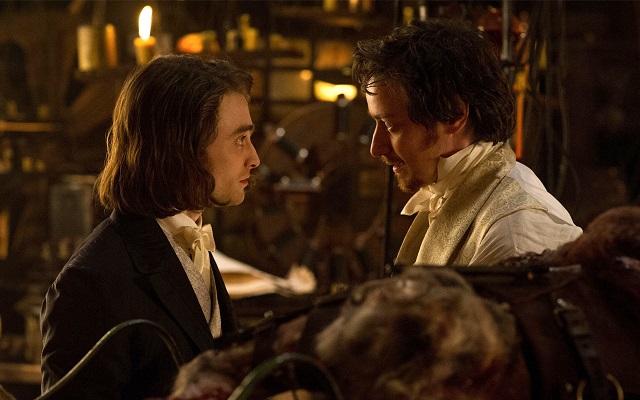Twice in Victor Frankenstein, voiceover narration from actor Daniel Radcliffe, who plays Igor, tells us that we know the story. That’s true only to a certain extent. Yes, we know that Frankenstein assembled a creature from various body parts and brought it to life. However, that’s about the only thing familiar in this tale as seen through the eyes of Igor. Nearly everything else is new and different; in which case, we don’t need to be reminded of a better story.
I may be harsh on this movie because Frankenstein is my favorite of the classic monster legends; it’s tough to please me. I wouldn’t have minded Igor’s viewpoint if it was the Igor we know: the dim-witted hunchback who accidentally steals the criminal brain that makes Frankenstein’s creature a monster. But here, he’s Frankenstein’s intellectual equal, if not superior, and his hump is removed early in the movie by simply lancing it and draining it.
Do we really need an origin story for Igor that very nearly turns him into an action hero, escaping watery graves and scaling rocky cliff walls? No matter how unique a character, he’s never going to be as fascinating as Frankenstein, played here by James McAvoy. Perhaps if he weren’t so wishy-washy, vacillating between thinking Frankenstein is doing the right thing versus the wrong thing, it would be a stronger perspective on which to base a movie.
Overall, Victor Frankenstein is simply an odd version of the story. For everything I liked about it, there was something I disliked… intensely. For example, it’s filmed creatively, with anatomical drawings sometimes superimposed over live action images, demonstrating what Igor and Frankenstein see beneath the skin. However, it uses slow motion for emphasis in scenes that do not need it. It reminded me a little of Guy Ritchie’s Sherlock Holmes, with not quite as much cinematic trickery.
Were writer Max Landis (Chronicle) and director Paul McGuigan (Push) trying to make a hip, young version of Victor Frankenstein and his sidekick, Igor? I’d have to ask viewers much younger than me if they felt differently about the result here. I have a hard time with modern-acting characters in industrial age settings. They’re not quite swashbucklers, but as London’s Parliament is still being constructed, they’re dancing and talking like it’s the 21st century.
Victor Frankenstein actually begins like another classic horror legend, The Hunchback of Notre Dame. Igor, who has no name at the time, is a circus clown who pines after lovely trapeze artist, Lorelei (Jessica Brown Findlay). Their relationship is similar to that of Quasimodo and Esmerelda. But when Igor is no longer a hunchback, there don’t seem to be any obstacles for the two of them to be together. His questionable ethics don’t ever drive her away.
Frankenstein, picking up discarded animal parts at the circus, recognizes Igor’s talents when Lorelei takes a fall from the high wire and rescues him from his literal and figurative prison. The movie is really not about Frankenstein’s monster; it’s about a different creature that he creates: Igor. He cures him and cleans him up and turns him into an entirely new being. That’s fine and I think most people get that, but it still has to be verbalized for us during the finale, something else I disliked intensely.
Subtlety is lacking in Victor Frankenstein. Everything is over the top, from McAvoy’s acting to laboratory explosions. Granted, there’s not much subtlety in the story itself, but there are quite a few times in the movie the action could have been restrained. However, there is one divine moment during the climax, as the creature is raised into the sky during a lightning storm and Frankenstein cries out for it to come to life. It’s the modern day “It’s alive” moment from the original 1931 version.
Another like and dislike for me are two supporting characters. I liked Inspector Turpin (Andrew Scott) from Scotland Yard, who is convinced that although Frankenstein may not have committed any legal crimes, he has certainly created crimes against God and man. I disliked Finnegan (Freddie Fox), Frankenstein’s benefactor who is late in the movie portrayed as the real villain of the story. His role in the movie seems contrived to bring all its pieces together.
Victor Frankenstein would have worked for me if it was told from prison by Igor as a misshapen lackey with delusions of grandeur, who is simply imagining he played such a vital role in Frankenstein’s experiments. Sorry I’m stuck on it, but I really wanted to see an explanation for why he chose a bad brain, if the movie focused on elements we know with a different twist rather than elements we don’t know with none. Heck, he and Frankenstein don’t even rob any graves!
There’s one other way to think about Victor Frankenstein that makes it a little easier to accept: if the entire thing were merely a prequel to the story we know, instead of a retelling of it. There’s a hint at the end that it might be just that, in which case I can put the movie in perspective and it doesn’t damage a beloved classic. I can leave the theater assuming that Frankenstein will mellow and Igor will grow his hump back so the two can pursue their dreams on a smaller scale.




